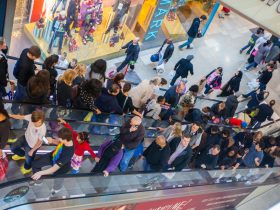Shoppers will spend an estimated £177 on average, a sharp decline from previous Black Fridays, where consumers would spend well above the £200 mark, according to new research
Consumers will cut back during Black Friday sales with spending expected to dip 15% to £1.7bn as the cost of living crisis forces UK households to cut back.
Shoppers will spend an estimated £177 on average, a sharp decline from previous Black Fridays, where consumers would spend well above the £200 mark, according to new research from Retail Economics and HotUKDeals.
The most affluent households are expected to spend around 13% more than the average, as they look to bring forward Christmas purchases to take advantage of discounts given inflation.
But the least affluent expect to spend 9% less than average, focusing more heavily on essentials.
While Black Friday on 25 November will remain a predominantly online event, with two-thirds of spending, equating to around £1.2bn, projected to be generated online, shoppers wanting to bargain hunt are expected to hit the high streets.
Low-affluence shoppers are twice as likely to shop exclusively in-store this Black Friday, compared to more affluent shoppers, as they look to manage spending with cash and search for local markdowns.
With household finances under so much pressure, consumers will be looking to take advantage of these discounts, but with budgets stretched to breaking, they will be more thoughtful in their approach, interrogating the veracity of deals on offer more than ever before and doing their research before being drawn into impulse spending, Vix Leyton, consumer expert of HotUKDeals, said.
There will also be many shoppers looking to spread the cost over as long a period as possible, so Black Friday still represents a big opportunity to retailers who are strategic and canny, Leyton said.
For the first time in its 92-year history, the FIFA World Cup will be kicking off much later than usual with the first game being played on 20 November, just five days before Black Friday. This is expected to boost sales in food, electricals and apparel as people gather to watch the matches, giving an additional £269m boost to overall Black Friday spending.
Around one in five (21.2%) Black Friday shoppers anticipate they will spend more during the promotional period this year compared to last year as a direct result of the World Cup.
It’s almost inevitable that Black Friday will be a more muted affair this year as families struggle to make ends meet. The backdrop of rising inflation, escalating interest rates and softer consumer confidence suggests consumers will be holding back their spending as they focus on essentials, Richard Lim, CEO of Retail Economics, said.







Leave a Reply